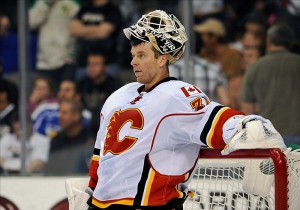The Calgary Flames are certainly correctly proving the adage that March roars in like a lion and peters out like a lamb. Beginning the month as a self-described playoff bubble team that just is in need of a big winning streak, the Flames currently find themselves coming off an embarrassing 8-2 loss at home to the Edmonton Oilers, having traded away Jarome Iginla and Jay Bouwmeester for underwhelming returns, and nine points out of a playoff spot.
The conversation about the playoffs is essentially over in the Stampede City for this season. The deluded goal of scraping into the playoffs with the hopes of a miracle run is dead. The Flames, despite having now authored the writing on the wall, are still defiantly referring to their rebuild as a re-tooling. The dismantling of this aging core has been long overdue, and the insignificant returns have done nothing to placate an exhausted fan base.
General Manager Jay Feaster, during his press conference to discuss the organization’s choice to honour the veteran goaltender’s decision to remain in Calgary this season, dropped an unfathomable bombshell yesterday regarding the immediate future of the franchise.
“Murray Edwards told me last evening that he expects to be in the playoffs next year. So, there’s my marching order.”

Mr. Feaster and Mr. Edwards, with all due respect, the Flames faithful beg your unbelievable pardon. In the last week, the Flames have traded their franchise player and best defenceman in salary cutting moves in return for unheralded prospects and two first round picks in this year’s draft- one of them conditional. They have stressed going younger, with Feaster mentioning that assistant General Manager John Weisbrod has introduced a motto of not attaining any more post-apex players. The Flames would have traded franchise wins leader Miikka Kiprusoff to the Maple Leafs on deadline if the goaltender had agreed to it, likely for further future-oriented returns.
How do the Calgary Flames ownership group and management believe a playoff appearance is possible next year? Rebuilding a team by going younger is a years-long process. While Edmonton and the New York Islanders have shown that it doesn’t always grant immediate returns (both teams are playoff bubble teams for the first time in a half decade this year), even successful models show that Rome cannot be built in a day. Pittsburgh Penguin teams with Sidney Crosby and Marc-Andre Fleury on them missed the playoffs. So did St. Louis Blues teams with David Backes, TJ Oshie, and Alex Pietrangelo. Patrick Kane, Patrick Sharp, Jonathan Toews, Duncan Keith, and Brent Seabrook were key members of a 2007-2008 Chicago Blackhawks team who played exactly zero playoff games that season.
Apparently, the Flames management and ownership group believes that it can simultaneously rebuild and make the playoffs by playing young players, having an unproven netminder, and an emaciated defence. This is, to trumpet a phrase Feaster has so willingly thrown around during the past week’s proceedings, the exact opposite of intellectual honesty. This is not only an absurd notion, even taking into account the blue-chip prospect the Calgary Flames will acquire at this summer’s draft, but could serve to dismantle an already half-baked rebuild. This is simply not the kind of sentiment the team needs to be putting out there. The fans are ready for a rebuild. They understand a rebuild. They want a rebuild. They need a rebuild.
In the interest of playing devil’s advocate, there is only one feasible way the Flames could honestly be considered to be a rebuilding team and make the playoffs next year. With the salary cap shrinking from $70 million to $64 million next season, some teams will undoubtedly be forced to shop big ticket players or subject some to amnesty buyouts. A quick look over cap geek reveals that the following teams will likely be forced to make some salary decisions this upcoming summer in order to ensure a full, competitive NHL roster:
Boston
- 16 players under contract, $7.7 million in cap space
- Prominent expiring contracts: Tuuka Rask (RFA), Nathan Horton (UFA)
Vancouver
- 14 players under contract, $2.2 million in cap space
- Prominent expiring contracts: Derek Roy (UFA), Maxim Lapierre (UFA), Mason Raymond (UFA)
Chicago
- 16 players under contract, $5.9 million in cap space*
- Prominent expiring contracts: Viktor Stalberg (UFA), Michal Roszival (UFA), Ray Emery (UFA)
- *Chicago also has $5.9 million combined buried in the minors in Steve Montador and Rostislav Olesz.
Pittsburgh
- 16 players under contract, $8.5 million in cap space
- Prominent expiring contracts: Jarome Iginla (UFA), Brenden Morrow (UFA), Matt Cooke (UFA), Pascal Dupuis (UFA), Douglas Murray (UFA), Tyler Kennedy (RFA)
Minnesota
- 16 players under contract, $9 million in cap space
- Prominent expiring contracts: Pierre-Marc Bouchard (UFA), Matt Cullen (UFA), Cal Clutterbuck (RFA), Jared Spurgeon (RFA), Justin Faulk (RFA), Nicklas Backstrom (UFA)
Calgary could potentially make a home run trade for either expiring RFAs that are too expensive for teams to resign or a big-money player who finds himself in an odd-man-out situation. Additionally, on the off chance a young player finds himself an unrestricted free agent thanks to an amnesty buyout situation the Flames could add another young piece. While this is certainly capable of happening, given Calgary’s upcoming $23 million in cap space, a lack of bargain tradeable assets could hold them back.
However the management decides to proceed, it is certainly clear that any sacrifices that have to be made to any rebuilding efforts for the sake of a playoff appearance would be a monumental mistake. A team that has decried a rebuild similar to the Edmonton Oilers for years just saw that Edmonton team put eight pucks past them on their home ice. The Flames have a choice to make, and given the recent performance from an organizational standpoint it is certainly nerve wracking that they might make the wrong one.